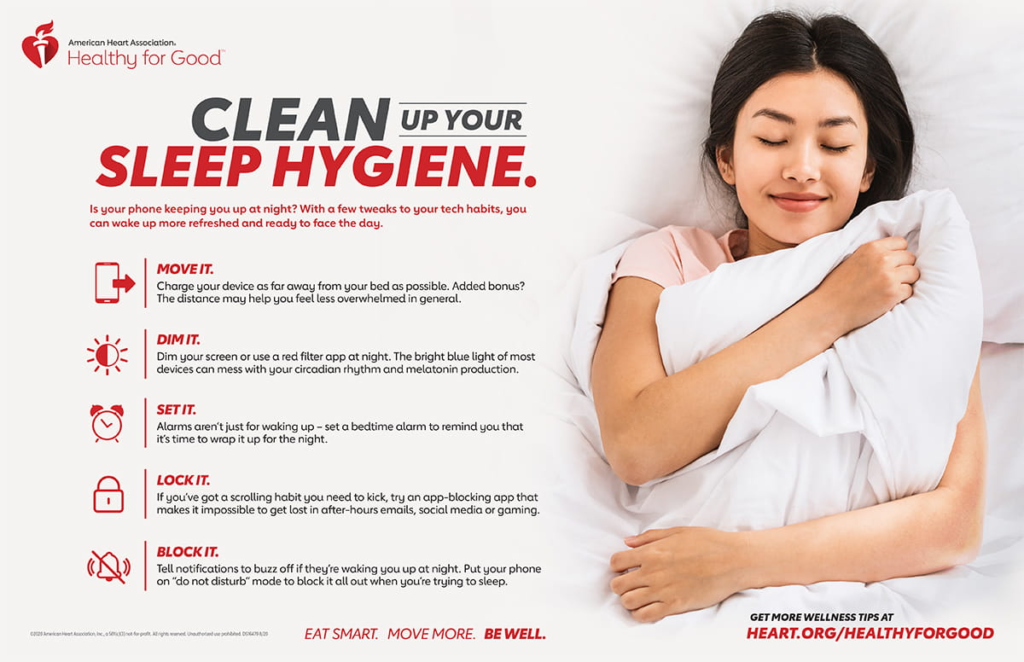
Introduction
In our fast-paced world, sleep often takes a backseat to work, social commitments, and entertainment. However, neglecting quality sleep can have far-reaching consequences for our physical and mental health. Sleep hygiene, a set of practices designed to promote better sleep, is essential for optimizing our overall well-being.
The Importance of Quality Sleep
Sleep is not merely a passive state of rest; it’s a dynamic process that plays a crucial role in various bodily functions. During sleep, our bodies undergo vital restorative processes, including:
- Physical Restoration: Repairing tissues, building muscle, and boosting the immune system.
- Mental Restoration: Consolidating memories, enhancing learning, and improving cognitive function.
- Emotional Regulation: Balancing mood and reducing stress.
The Toll of Sleep Deprivation

Chronic sleep deprivation can lead to a cascade of health problems, such as:
- Physical Health Issues: Increased risk of heart disease, stroke, diabetes, obesity, and weakened immune function.
- Mental Health Challenges: Elevated risk of depression, anxiety, and impaired cognitive abilities.
- Accidents and Injuries: Reduced alertness and slower reaction times can increase the likelihood of accidents.
Key Principles of Sleep Hygiene
To cultivate optimal sleep hygiene, consider the following principles:
- Consistent Sleep Schedule:
- Stick to a Routine: Aim to go to bed and wake up at the same time each day, even on weekends.
- Avoid Irregular Sleep Patterns: Inconsistent sleep schedules can disrupt your body’s internal clock.
- Create a Relaxing Bedtime Routine:
- Wind Down Gradually: Dedicate a specific time for relaxation before bed.
- Limit Stimulating Activities: Avoid screens, work, and stressful activities close to bedtime.
- Practice Relaxation Techniques: Engage in calming activities like reading, meditation, or taking a warm bath.
- Optimize Your Sleep Environment:
- Dark, Quiet, and Cool: Ensure your bedroom is conducive to sleep by minimizing noise, light, and temperature disturbances.
- Comfortable Bedding: Invest in a comfortable mattress, pillows, and bedding that suit your preferences.
- Limit Distractions: Remove electronic devices from your bedroom or use them in night mode.
- Mindful Use of Stimulants and Depressants:
- Moderate Caffeine Intake: Limit caffeine consumption, especially in the afternoon and evening.
- Avoid Excessive Alcohol: While alcohol may induce sleep initially, it can disrupt sleep quality later in the night.
- Be Cautious with Medications: Consult with your doctor about any medications that may affect your sleep.
- Healthy Lifestyle Habits:
- Regular Exercise: Engage in regular physical activity, but avoid intense workouts close to bedtime.
- Balanced Diet: Consume a nutritious diet, but avoid heavy meals late at night.
- Manage Stress: Practice stress-reduction techniques like yoga, meditation, or deep breathing.
Addressing Specific Sleep Issues

If you’re struggling with specific sleep problems, consider these additional tips:
- Insomnia:
- Cognitive Behavioral Therapy for Insomnia (CBT-I): A proven therapy that teaches cognitive and behavioral techniques to improve sleep.
- Relaxation Techniques: Practice deep breathing, meditation, or progressive muscle relaxation.
- Limit Screen Time: Reduce exposure to blue light from electronic devices before bed.
- Sleep Apnea:
- Consult a Doctor: If you suspect sleep apnea, seek professional diagnosis and treatment.
- Lifestyle Changes: Maintain a healthy weight, avoid alcohol and sedatives, and quit smoking.
- Continuous Positive Airway Pressure (CPAP): A common treatment for sleep apnea that involves wearing a mask while sleeping.
- Restless Legs Syndrome (RLS):
- Consult a Doctor: Seek medical advice to determine the underlying cause and appropriate treatment.
- Lifestyle Changes: Regular exercise, avoiding caffeine and alcohol, and applying heat or cold compresses to restless legs.
- Medications: In some cases, medications may be prescribed to alleviate symptoms.
Conclusion
Prioritizing sleep hygiene is a proactive step towards a healthier and happier life. By implementing these strategies, you can improve your sleep quality, enhance your overall well-being, and unlock your full potential. Remember, quality sleep is not a luxury; it’s a necessity.Sources and related content
Sleep Deprivation and Deficiency – How Sleep Affects Your Health | NHLBI, NIH
Mastering Sleep Hygiene: Your Path to Quality Sleep – Sleep Foundation
Information about Sleep – NIH Curriculum Supplement Series – NCBI Bookshelf
What happens when we sleep, and why we need just the right amount each night
Sleep On It | NIH News in Health
Upload an image
This prompt requires an image that you need to add. Tap the image button to upload an image. Got it